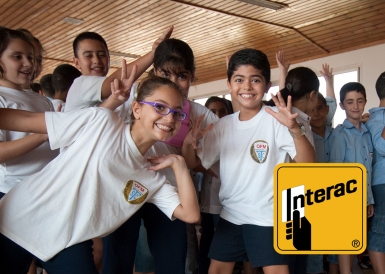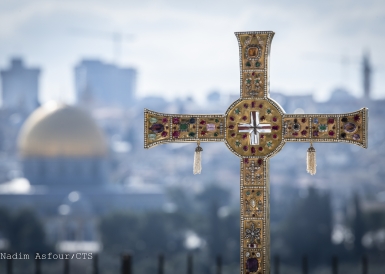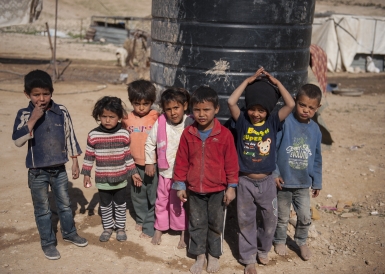
For weeks, the Israeli government has faced massive rallies against its proposed reform of the Supreme Court. In the crowd, there are demonstrators who are impossible to miss since their outfit is so eye-catching: women by the dozens, sometimes more than a hundred, dressed in the scarlet robes of the Handmaids. Their fight is to defend women's rights against those who want to make them invisible.
- By Karine Eysse
This unlikely group progresses slowly, slowly, one step, then the other, one step, then the other – pianissimo, with no break in rhythm. From a distance, it looks like a block or uniformly red line punctuated at regular intervals by touches of white. In front of the group, the usual crowd of anti-judicial reform demonstrators is coming together - a dense, colourful, and compact crowd, with placards brandishing slogans raised high, and with whistles in mouth and drums in hand. Moving forward in this packed crowd is a challenge. Yet the group is getting closer, quietly, always pianissimo, and without anyone having to open the road for it. And then, the path opens up: the demonstrators move away, as if a tacit command ran through the demonstrators. The group then passes silently, and one realizes that this is not a single entity, but an accumulation of women, dozens of women, walking in line two by two, each dressed in the same outfit – a long scarlet cape, white headdress with broad wings, hands crossed under their capes, heads bent downwards.
Women's rights at risk

The modest posture is far from being haphazard: it is identical in every way to that described by the Canadian writer Margaret Atwood in her dystopian novel published in 1985, which became a world bestseller, The Handmaid's Tale.
In this futuristic novel, Margaret Atwood imagines a theocracy, the Republic of Gilead, established somewhere in North America, and founded on a ferocious repression of all elements considered to contravene a strictly established extreme religious order. In this society of ultra-segregated social classes, women’s rights are particularly oppressed. One particular category of women is distinguished by its unique purpose: the Handmaids, dressed in red from head to toe and wearing white headdresses, each of whom is assigned to an upper-class family - the Commanders – for the single purpose of reproduction.
This dystopian novel has had worldwide success. The work has also been adapted many times and distributed, in different forms, through a variety of television channels, which has contributed greatly to the worldwide popularity of The Handmaid's Tale, and to relaying its message about women's rights.
It has made its way even to Israel as part of the protests against judicial reform. If the first most spectacular appearances of the Israeli Handmaids were observed in Tel Aviv, it was not long before they spread throughout the country: in Jerusalem, in front of the Knesset (the Israeli Parliament) but also in cities much less accustomed to demonstrations, such as Kfar Saba in the center of the country, or Ra'anana northeast of Tel Aviv.
In Israel, there is an association promoting this Handmaids movement: it is Bono Alternativa, a Hebrew expression that literally means “They’re creating an alternative”. Bonot Alternativa was born in 2020 out of anger over the gang rape of a teenage girl Eilat, in the south of the country. The association claims to be apolitical, and explains that it campaigns for the rights of all women, regardless of their social, ethnic or religious affiliation – whether they are Jewish, Muslim, Christian, religious, or secular ... In this country where the right-wing coalition – the extreme-right established by and built around Benjamin Netanyahu – is facing a massive revolt from the street against his project to reform the Supreme Court, the women of Bonot Alternativa intend to turn attention to the attacks that this government is about to carry out, according to them, against their rights and freedoms.
The 46-year-old Meital, who took part in a massive demonstration in front of the Knesset on March 27, did not wear the red cape and white headdress, but rather wore a T-shirt with the colours of the Bonot Alternativa logo stamped on the back.
Among the more than 100,000 demonstrators present that day, according to Israeli media, many of them showed their support for the feminist movement as being at the heart of the anti-judicial reform protest. This is not the first time that Meital has demonstrated; far from it: “I am a regular in street protests, but usually I am there more to say no to the Occupation,” she explains. “Today is the first time I have come with Bonot Alternativa colours. This is no coincidence: for me everything is interconnected. If you don't care about Palestinian rights, women's rights will be attacked next. This is only the next logical step for a coalition that considers these two categories of the population as minorities with negligible rights.”
And Meital continues: “It has already begun. Look at what happened with the law on the restraint of violent men, reality has already caught up with us!” This law that Meitel is talking about has, in effect, a bearing on all that the women who have come to demonstrate under the colors of Bonot Alternativa want to say. It concerns a text prepared by the former coalition, providing for restraining orders with surveillance by electronic bracelet against violent spouses. The text was ready, having already been adopted at first reading by the previous Knesset, and hailed as an effective tool by associations specializing in the care of women who were victims of domestic violence. It had to be passed by the legal commission of the new assembly. However, its examination has been postponed twice, at the initiative of the Minister of Internal Security, Itamar Ben-Gvir. This far-right figure, one of the most prominent ministers in the current coalition, explained that it would take at least another six months for the government to present a new text, which he believes would be better able to guarantee a better balance between the protection of women and ... the risks of false accusations against men.
The first signs

Just a few days after the first postponement of the text’s reading and the announcement of at least a six month [delay], a young woman, Darya Leitel, was murdered by her husband, against whom she had already filed a complaint. A few days after the second postponement, Eldisi Elbena died from her companion’s beatings. These killings were the last straw for many, but many protesters have pointed to many other areas of concern. Thus, Ayelet, 47, points to the presence in the coalition of two ultra-Orthodox parties, United Torah Judaism and Shass, which not only have no elected women representatives in their ranks and are not likely to have any since they purely and simply refuse to present women. No wonder, then, that the current government has barely six women for every twenty-six men. None of them occupy (but it goes without saying) a key position. The question of the rabbinical courts’ influence, which these parties would like to extend, is of particular concern to Ayelet.
“I don't want my daughter to have to sit at the back of the bus; I don't want her to have to think about how to dress to please the religious [establishment]; I want her to be able to do any job, as long as she chooses it.” At her side, thirteen-year-old Adar, also wearing a Bonot Alternativa T-shirt, joins in: “I want to grow up in a country where I am free.” In short, to sum up Ayelet and Adar’s concerns: they are alive and real and far, very far, from being fiction.



